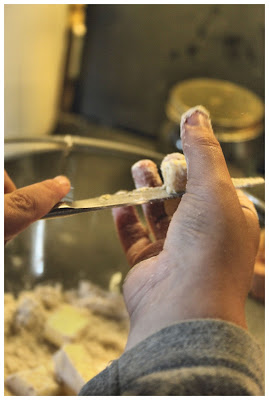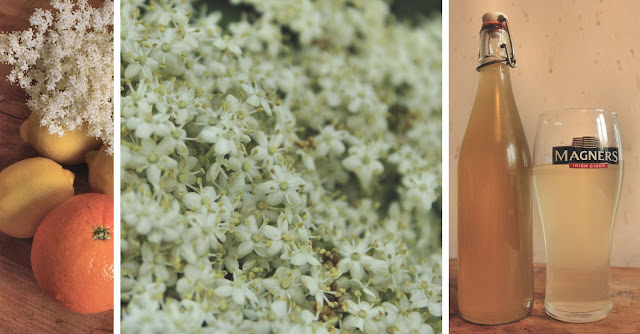(A little note - blogspot has stolen my nice background again, and none of my carefully centred pictures are in the centre. I am blameless.)
I fully acknowledge that, again, it's not Wednesday. In fact it's a rather pleasant Saturday with some early September sun. The bees are busy, the flowers are open, and there are blackberries ripe on the brambles. Thanks to the fields at my parents' being left largely to their own devices in places there are brambles all over the place, which is wonderful. There's none of the 'will the hedge cutters come just before the blackberries are ripe?' anxiety that has prevailed in the past, because there are blackberries aplenty in the field. And what better to do with blackberries than to make a pie?
Actually I can think of a few good things. Eating them straight from the bush springs to mind. Making bramble jelly is another. But for today, pie it is!
First up is to go out into the fields and pick some blackberries. The children started this, gathering a handful of late raspberries and then some blackberries. Then four geese scared them inside, so off I went to pick a few more, Ben on my hip and the dog snuffling around at my heels. There's nothing like picking blackberries from prickly brambles surrounded by gorse and nettles. My hands still feel a little tingly.
Next up was to make the pastry. I enjoy making pastry. Or I should say I enjoy eating pastry. I enjoy the fact that the fruits of my labour will be short and crumbly and melting in the mouth.
I always use the Good Housekeeping Cookery Book for pastry making (since it's usually been long enough that I'm not sure of the amounts or cooking temperature.) This book is my bible in the kitchen. You can tell how much it is used by the amount of centuries old flour on the page. I also learnt a few handy tips in the short time that I was learning catering in school, such as use only your fingertips to rub the fat into the flour. Ideally your palms should stay clean. Keep everything as cold as you can.
Recipe
I used these quantities to make a pie of about 8 inches diameter -
8oz flour (I used brown spelt flour.)
2oz lard
2oz margarine
A little water.
Blackberries (or other berries) - enough to fill your pie.
A little sugar.
Egg to glaze.
Oven: 220°C (or 425°F, or Gas Mark 7)
Once you've weighed out your flour and fat, you get a small kitchen minion (in this case George, who loves baking almost as much as he loves eating what he cooks) to cut the fat into small pieces, to make it easier for rubbing in. Then rub the fat into the flour with your fingertips (clean and cold hands are best!) until it resembles breadcrumbs. Then mix in water (tiny, tiny quantities to be sure you don't put in too much and make your pastry tough and doughy!) I didn't have to put any water in at all this time. The fat was sufficient to hold the flour together. Once it's moist enough to stick together, roll it into a ball, flour the worksurface well, and start to roll it out with a light hand and plenty of flour on top of the pastry as well as below so that the rolling pin doesn't stick!

You can easily get your minion to help with the rolling out. If you want an even sheet of pastry I'd suggest helping, though. Make it about a quarter of an inch thick. Or half a centimetre, if you're feeling metric. If it's lovely and short, as it should be, you'll have a hell of a time picking it up to drape it over the pie dish. I forgot to mention the pie dish. You'll need a pie dish of about 8 inches diameter, and be sure to grease it with margarine (or butter if you don't have dairy intolerant children.) Also, some time during the rolling out is a good time to put the oven on to preheat, at 220°C (or 425°F, or Gas Mark 7).

Once your pastry is rolled out you can prise it off the worksurface with a palette knife and lay it over your pie dish. If it's short enough it will probably crack like an earthquake-torn country and you'll weep and make a ball again and roll it out again, and you might have better luck the second time. Or you'll put up with the cracks and just squish them together once you have the pastry in the pie dish. Once you've laid the pastry over push it down gently into the dish and cut off the excess around the top with the palette knife. When your pastry is nicely bedded down fill the dish with your berries and sprinkle with sugar, as much as you feel is necessary. I don't have a very sweet tooth, but I found some lovely vanilla sugar that my mum had made by putting vanilla pods in a jar of sugar and that complimented the taste of the blackberries beautifully.

Hopefully you will have enough pastry left to roll out to make the top. Lay that over the dish just as you did before, and cut around the top with the palette knife. Crimp the two sheets of pastry together with your fingertips by pressing the top layer into the bottom. I still had enough pastry left over to cut out a lot of little pastry leaves with a table knife. I brushed a beaten egg over the top of the pie and arranged the leaves to garnish, then brushed those with egg too.
Voilà! Your pie is complete! (Well, mine is, anyway.) Put into the centre of a pre-heated oven for about 15 minutes. Be sure to keep an eye on it in case it needs a little more or less time.
Once your pie is cooked you can sprinkle a little icing sugar over the top to make it look pretty, if you're going to take photos of it, anyway.
Cut, and serve! Blackberry joy is yours!
I would have enjoyed some expensive vanilla ice cream with this, or some clotted cream. Thankfully for my waistline we had neither. It was still lovely.















































